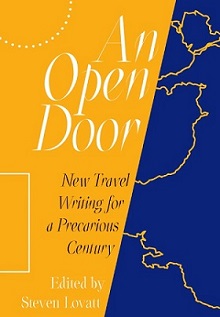| Not Really Going Anywhere |
Places |
| An Open Door , Parthian Books , July 10, 2022 |
 A new anthology on travel should be a tonic after a time in which no-one went anywhere very much. As a genre travel writing, now in decline, peaked in the 1940s when, remarkably, four titles a week were published.
A new anthology on travel should be a tonic after a time in which no-one went anywhere very much. As a genre travel writing, now in decline, peaked in the 1940s when, remarkably, four titles a week were published. It is an elusive category. It is not documentary as Paul Fussell revealed when he looked back at Robert Byron. When Bill Bryson wrote on Australia the text revealed that his narrative was a composite of several visits. But from “Eothen” onward it has been a source of much fine writing. At its best there is a nice line by Jim Perrin that captures the freshnes of a new encounter. It “gives you something to question, pictures to create in your mind, purposes to unravel, the jigsaw of history to piece together from the disparate elements of fact, feature, literature, place, imagination and mood.” “An Open Door” does not begin promisingly. The editor has a bee in his bonnet that travel, and its writing, are a hegemonic domain for the rich. “Prior to the mid-twentieth century, leisured travel was largely the preserve of a wealthy elite.” The Reverend Kilvert in his journals from Clyro was complaining about the excess of tourists. The platform at Aberystwyth is of its huge length to accommodate trains with eighteen carriages packed with visitors in the town's Edwardian heyday. Ideology trumps observation. The closely related genre of nature writing "tended to overlook the historical and cultural specifics, the experiences and daily lives, of those who actually inhabit ‘nature’. The editor has probably not read Catherine Hutton (1756-1846) on her visits to Meirionnydd. Her lively voice in “Reminiscences of a Gentlewoman of the Last Century” looks with great details at lives in Mallwyd and Dinas Mawddwy. The editor has a view on the “persistent privileging of the male ‘expert’. His book is a remedy. “An Open Door” can certainly be interpreted as a challenge to this hegemony.” This would be a surprise to the many readers of Dervla Murphy, author of 26 travel books who died aged 90 on 22nd May. It would be a surprise too to the travel writers Gertrude Bell, Isabella Bird, Willa Cather, Isak Dinesen, Isabelle Eberhardt, Amelia Edwards, Mary McCarthy, Rose Macaulay, Beryl Markham, Lady Mary Wortley Montague, Maud Parrish, Vita Sackville West, Freya Stark, Frances Trollope, Rebecca West, Edith Wharton, Mary Wollstonecraft. When Tsarist Russia transported its prisoners to Siberia Lucy Atkinson was there in 1863 to record them in her “Recollections of Tartar Steppes and Their Inhabitants.” Good travel writing works via a contrapuntal method. It is about place. A little about the self is good; a lot of self not. The book has eleven essays and there is a lot of self in it. The word “I” features and features and features. The language is often slack. “Part of the attraction of green space is that it has the potential to ground us.” The language is colloquial as in “can't”, “I've” and “aren't.” “Stateside, I am a rube” is a line beyond the general reader. Parts resemble a diary entry: “At Cardiff Central, the London train is thirty minutes late. We sit and stare at the station clock, desperate for no further delays.” The language spans the flat to the high-faluting. At one end “the day on Bardsey Island is crammed with interest, what with the seal colony, the bones of 20,000 saints, the crumbling abbey.” At the other “we perform an exercise in oral tradition, a transfer of memory so that my son can graft himself onto this new city.” Metaphors need to be easeful when they are used. “The hours drip like honey on Sapelo, resistant but sweet” calls too much attention to itself. “Western cities are all alike in the same way that shopping centres mirror each other, and airports are their lovechild.” Cities have overlap but cities also have their distinctions. The account of the Highland Clearances is not accurate. The destinations, Somalia, South Carolina, are interesting. The book ought to be a better thing than it is. Its weaknesses are those that are regular in publishing of Wales. The absence of a firm, experienced editor is manifest. |
Reviewed by: Adam Somerset |
This review has been read 807 times There are 46 other reviews of productions with this title in our database:
|
